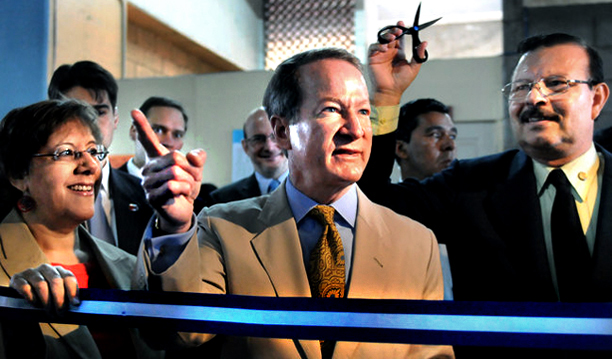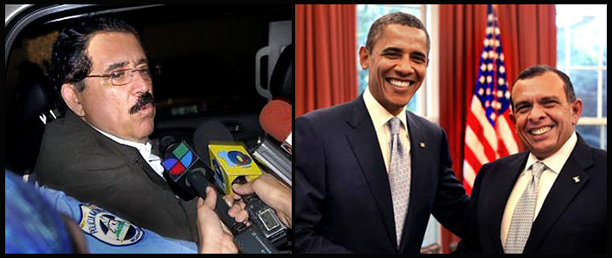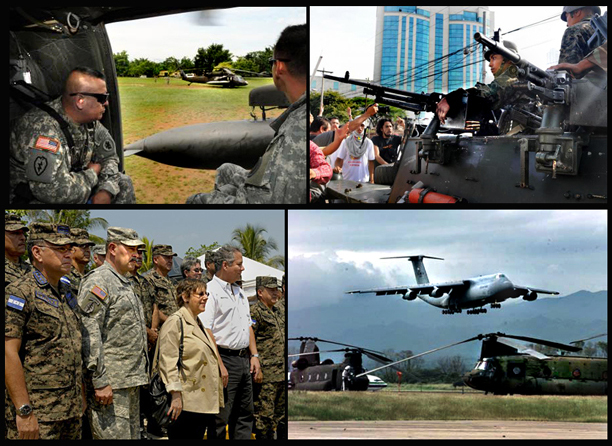Stop feeding the beast.
– Julieta Castellanos*
William Brownfield is a major architect in the current linkage between the failed Drug War and the War On Terror. He may succeed in making it an even greater failure in the future.
Brownfield has been Assistant Secretary of State for International Narcotics and Law Enforcement since January 20 of last year. Before that, he was the US ambassador to Colombia; and before that, he was the US ambassador to Venezuela, where he was notorious for taunting President Hugo Chavez.
Mr. Brownfield attended the National War College, and he speaks Spanish with a pronounced Texas accent. He reportedly considers himself a Texan — though, like George W. Bush, he was not born in Texas and has lived much of his life elsewhere. It seems being a “Texan” is a state of mind, especially vis-à-vis Latin America which has been Brownfield’s area of interest. He’s now looking to expand his war-making efforts into Africa.
 William Brownfield up close and speaking in Guatemala with Guatemalan military officials behind him
William Brownfield up close and speaking in Guatemala with Guatemalan military officials behind him
It’s clear that Mr. Brownfield isn’t one of those striped pants diplomats from foggy bottom determined to keep tempers from reaching the boiling point. He doesn’t seem burdened by doubt, and he seems comfortable strategizing for war.
Regardless of party affiliation, it’s people like Brownfield who have turned the 40-year-old War On Drugs and The Global War On Terror into one all-encompassing, global war against “bad guys,” a category to be defined as the war moves “downrange.” Like grand chefs, these strategists have put the two wars into a National Security State blender and come up with what is The War Without End. American citizens were never asked if they wanted this war. It wasn’t necessary to ask — since Americans are encouraged to get lost in themselves and all the available bread and circus around them. We haven’t kept our eye on the ball and we now find ourselves the unwitting sustainers of an Orwellian state of constant war.
Wars are easy to start, and that was true of the War On Drugs, which was kicked off back in the days of NY Governor Nelson Rockefeller and Ronald & Nancy Reagan. Gee, there were all those horror stories of how desperately low humans can go when they fall prey to the abuse of certain drugs. Vietnam was over, so the culture needed a “war” and all the mobilization, demonization and de-humanization a war entails.
At the close of the Vietnam War, Richard Nixon had had a quite liberal drug policy. Why? One reason was all the strung-out soldiers coming back from Vietnam. The Commander In Chief couldn’t very well demonize his own troops; so he developed a demand-focused program. But, then, the problem sunk deep into the frustrated Black ghettos, where the demonization process had roots in American racism, making the idea of “war” palatable. This is all reported by Michelle Alexander in her profound book The New Jim Crow about the “felonization” of Black Americans. That is, if you can’t stigmatize ‘em one way, you stigmatize ‘em another way. The result’s the same: Our jails and felon-lists are overly populated with African Americans.
This war has grown into a sophisticated military campaign to stanch the flow of a global capitalist enterprise that follows all the rules of supply and demand. Stripped of all the demonization and good guy versus bad guy crap, the War On Drugs is a war about markets and products.
The fundamental dishonesty of the Drug War breeds corruption everywhere. In this country, it’s manifested in many ways, most noticeably this year in the depths of bullshit our politics has descended to. Our politicians don’t know how to speak the truth any more. Reasonable, pragmatic citizens are like the famous cartoon possum Pogo on Earth Day 1971 as he encounters his beloved swamp overwhelmed with detritus and garbage. His words became famous: “We have met the enemy and he is us.”
 William Brownfield and US Ambassador to Honduras Lisa Kubiske, at left, at a ribbon-cutting in Honduras
William Brownfield and US Ambassador to Honduras Lisa Kubiske, at left, at a ribbon-cutting in Honduras
William Brownfield is now at the helm pointing the failed, bloody Drug War into a new stage in a world noted for the blurring of the sovereign nation-state system into “regions” of interest; the tools of this effort are PR, drones and Special Operations hit-teams. It’s all about Capital and Power: Who has it and who doesn’t.
Coincident with this shift, many nations of Latin America have been moving to the left, something that has not escaped US National Security State strategists. In this context, Brownfield lauds Plan Colombia — the feeding with US tax resources of a rightist military government in Latin America — as “heroic” and “a model” for the seven nations of Central America and The War Without End. He feels the same way about the Mexican government’s assault on the cartels, which has led to the often grisly deaths of over 40,000 Mexicans.
“We will make mistakes,” Brownfield says. “There will be missteps.”
To get a feel for William Brownfield’s eloquent and arrogant style, here’s a 50-minute lecture on the background history of “Drug-Related Violence in Central America” that he gave last August at the Carnegie Endowment for International Peace in Washington DC. The talk is broken up into the six You Tubes linked below:
In his 50-minute talk he does at one point note the importance of addressing the demand issue at home. Still, his remarks make it quite clear he prefers to talk about “rule of law” issues, especially in vulnerable Central America. In fact, in Part Six, a retired foreign serviceman pointedly asks him about the “domestic demand issue.” It’s the third in a string of three questions, and in his answers he either forgets the question, misunderstands it as a question about his favored rule of law realm or he conveniently ignores it.
Honduras: Ground Zero In The War Without End
Right now — as The Nation fully examines — the poor nation of Honduras is dead-center in the middle of this ruthless mess. In a way, people like William Brownfield are the new imperial warrior-diplomats reminiscent of John Negroponte, who in the 1980s ran the Contra War against Nicaragua from his post as US Ambassador to Honduras.
I have a personal connection with Honduras and John Negroponte. In June of 1984, I was a journalist tagging along with five Philadelphia union men invited to Tegucigalpa, Honduras, to speak with union leaders about murders and disappearances among their ranks. As the launching pad for Reagan militarist policy in Central America, Honduras under “Proconsul” Negroponte was known then as the “USS Honduras.”
We spoke with the union people and appeared at a rally before 3,000 Hondurans in a central square in Tegucigalpa. As two from our delegation spoke against Negroponte’s Contra War — one in Spanish — the military burst in and shut down a live radio broadcast of the speeches. The next morning, we were arrested and deported.
History may have moved on from this repressive era, but little has changed. There was, of course, a coup in Honduras on June 28, 2009. The duly-elected president of Honduras — Manuel Zelaya — was awoken at dawn with a gun to his head, and in his pajamas he was flown out of the country. He was a left-of-center populist. The coup unleashed a wave of violence that has grown worse each year. Which, for the history buffs, is exactly the brutal arc kicked off by the 1954 US coup that ousted duly elected President Jacobo Arbenz of Guatemala. Today, over ten thousand reports of human rights abuses go completely unaddressed in Honduras. Yet people like Mr Brownfield say everything is the fault of the drug gangs.
 Ousted Honduran President Manuel Zelaya, President Obama and the post-coup Honduran President Porfirio Lobo at the White House
Ousted Honduran President Manuel Zelaya, President Obama and the post-coup Honduran President Porfirio Lobo at the White House
President Barack Obama and Secretary of State Hillary Clinton and others in Washington all made the appropriate squeaks and squirms when the coup went down. And then they did absolutely nothing. Many, including this observer, have no doubt powerful forces in Washington knew about the coup ahead of time and endorsed it. Washington could have stopped it and didn’t. The Obama administration even lauded the new post-coup president — Porfirio Lobo — for “restoring democracy.” George Orwell would have grinned.
So no one should be surprised or shocked about the story now coming out of Honduras — that the dirt poor Central American nation is being used by the United States for forward operating bases (FOBs) in its War Without End. These bases are, of course, complete with Special Operations capacities, drones and God-only-knows what else. Also, let’s not forget the PR side; reminiscent of the 1980s, the US military provides medical teams etc. But as Brownfield’s “history” emphasizes, everything wrong with Honduras is blamed on the drug gangs.
 .
.
Caption, photos above: Clockwise from top right: Scene from the 2009 coup. Soto Cono Air Force Base. The grand opening of the Beyond The Horizon military exercise with, second from left, US Major General Simeon Tromitas, commander of Army South Command; next to him, US Ambassador Lisa Kubiske and, in the white shirt, Marlon Pascua Serrato, Honduran defense minister. And US troops land at FOB Naco last month.
US business is, of course, well represented in Honduras. The current US ambassador to Honduras — Lisa Kubiske — reportedly is up to her neck with the biofuels industry. At her last post in Brazil, she won a State Dept Superior Honor Award for her efforts on behalf of United States-Brazil biofuels cooperation. According to Adrienne Pine who focuses a blog on post-coup Honduras, the biofuel industry is a major human rights violator in Honduras right now.
“The biofuels industry in Honduras,” she writes, “has been a source of grave human rights violations, to the degree that after investigating violations such as the massacre of campesinos in land rights conflicts, on April 8, 2011 the German Public Bank for Development (DEG) announced it was canceling a $20 million loan to Dinant, a Honduran palm oil company.”
She adds this:
“US corporations have a strong interest in the biofuel market as climate change mitigation measures are expected to result in a tremendous growth in demand for biofuels.
“In December 2010, scandal erupted around a US Embassy cable released by Wikileaks that described a February 2010 visit to Honduras by Republican Senator Dana Rohrabacher who took advantage of an official visit to bring a group of investors, including representatives of California based SG Biofuels, while lauding the military coup.”
It’s Deja vu all over again
Operation Hammer is one Mr Brownfield’s pet projects. It involves military drug interdiction along both the Caribbean and Pacific coasts of Central America. US Southern Command is fully in cahoots on all this. As the US militarizes the issue, a NACLA report points out that Central and South American leaders are lobbying the US to re-focus its War On Drugs from military attacks on Supply in their homelands to belatedly addressing the Demand side in the US homeland.
Even the right-wing president of Colombia — Juan Manuel Santos — publicly suggested this to President Obama at the Summit Of The Americas in Cartagena in April. For some reason this important piece of news failed to get traction in the US media. You’ll recall there was the lovely, big-breasted young lady who over-charged one of our horny secret servicemen.
The fact is, the US is going balls-to-the-wall to thwart talk of addressing demand at home in the USA. As it is going balls-to-the-wall to thwart state efforts to legalize marijuana inside the US. According to the NACLA report, these efforts may be succeeding in Central America:
“The prospects for changes to the drug war are now dimming, with waning support for (Guatemalan President) Pérez Molina’s proposal. On Saturday, March 24 (2012), the day before Brownfield arrived in Honduras, Pérez Molina hosted a regional summit on legalization that was attended by only Costa Rican President (Laura) Chinchilla and Panama’s Ricardo Martinelli. Pérez Molina said that U.S. pressure led to the other leaders’ absence from the regional conference.”
William Brownfield is the point man in this sales effort to keep the focus on the military and war in Latin America and, now, in Africa. And he proposes to use Plan Colombia and the baroque, bloody war with the Sinaloa Gang and The Zetas in Mexico as models.
If one can conceptually frame all this in a larger sphere of concern than the narrow “national interests” of the government of the United States of America, Brownfield has the mien of that ironically beloved, wild-eyed and blindered icon of US imperial history, General George Armstrong Custer. Like Custer, Brownfield seems determined for reasons of career or some self-reinforcing sense of glory to go to battle against a vast and immensely more populist, more naturally-rooted and logical force than he can mobilize on the battlefield he has chosen. When it’s reduced to its basics, he’s opposing the much vaunted Free Market. And in the glory realm, American Exceptionalism is driving this War Without End no less than Custer’s over-confidence and arrogance drove him into the Little Big Horn.
The idea that the US can militarily “solve” its drug problem at home with military force projected around the world is an idea that has been proven wrong by the facts of the drug market. Of course, if Custer had had better intelligence he might have been less foolish and survived; but I dare say, he would not have been less arrogant. If he had also had better public relations, maybe he could have finessed the battle of Little Big Horn into a big success. And if he’d understood the point wasn’t the glory of the battle; that it was the ruthless fate and logic of a long, genocidal war that counted in the end — then, maybe he wouldn’t even have marched into the Little Big Horn.
Mr Brownfield seems to understand the lessons about tempering imperial arrogance, but he doesn’t seem to appreciate that in this global era those harboring the impulse toward rebellion against arrogant empire have also learned from the same history, which includes the Vietnam War and the rest. He might benefit from mulling over the humble side of things, lest he and his over-confident cronies lead us into an even greater disaster than the state of the Drug War now.
During the Argentine Dirty War of the early 1980s, I knew a woman medical student from Argentina studying here in Philadelphia. I’ll never forget one night she told me with sadness and fear in her eyes that the problem in her country was that there was no one ruthless enough to stop them — them being the cutthroats and murderers decimating the left with the tacit support of the US government.
We’re in a new phase of that kind of problem; it’s now the Globalized US War Without End. The plot since the 1980s has certainly generated plenty of ruthless forces this time around. The problem from the US front seems to be that the United States, with all its history of Imperial bullying around the world, can’t give up the habit of being a bully. To paraphrase my Argentine friend, There’s no one powerful enough to stop us.
Yet.
_____________
* Juliet Castellanos is rector of the National Autonomous University of Honduras. In April of this year, in her role as US ambassador to Honduras, Lisa Kubiske awarded Castellanos the Martin Luther King, Jr Prize from the Martin Luther King, Jr. Foundation. “Ms. Castellanos has been an inspiration to a new generation of Hondurans and believes in fighting for a country where it is possible to gain justice, security and democracy,” Ambassador Kubiske said. It’s a bit ironic that she made the award since many feel she and the US have failed to address the human rights situation in Honduras.
Last year, Rector Castellanos’ son was murdered by police in Tegucigalpa. According to The Nation, “On October 22, an enormous scandal broke when the Tegucigalpa police killed the son of Julieta Castellanos, rector of the country’s largest university and a member of the government’s Truth Commission, along with a friend of his. Top law enforcement officials admitted that the police were responsible for the killings but allowed the suspects to disappear, precipitating an enormous crisis of legitimacy.”
